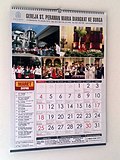While many Slavic languages officially use Latin-derived names for the months of the year in the Gregorian calendar, there is also a set of older names...
48 KB (1,609 words) - 00:59, 10 October 2024
Slavic peoples, eastern group of Slavic peoples South Slavic peoples, southern group of Slavic peoples West Slavic peoples, western group of Slavic peoples...
2 KB (296 words) - 15:54, 30 March 2024
reconstructs a basic calendar of the East Slavs' celebrations of Slavic gods, based on Boris Rybakov's studies of ancient agricultural calendars, especially a...
9 KB (350 words) - 13:27, 25 September 2024
week are simply ordinal numbers. The Lithuanian calendar shows some similarities with the Slavic calendars. Lithuanian researcher Libertas Klimka [lt] proposed...
9 KB (1,044 words) - 20:53, 10 March 2024
name from that of Saint Andrew. Gregorian calendar Slavic calendar Lithuanian calendar French Republican calendar Alexander, Michael (3 April 2019). "Romania:...
5 KB (229 words) - 07:27, 10 August 2024
This is a list of calendars. Included are historical calendars as well as proposed ones. Historical calendars are often grouped into larger categories...
33 KB (924 words) - 12:40, 17 October 2024
Given names originating from the Slavic languages are most common in Slavic countries. The main types of Slavic names: Two-base names, often ending in...
62 KB (3,193 words) - 22:28, 28 October 2024
Slavic paganism, Slavic mythology, or Slavic religion is the religious beliefs, myths, and ritual practices of the Slavs before Christianisation, which...
72 KB (9,083 words) - 12:46, 27 October 2024
A calendar is a system of organizing days. This is done by giving names to periods of time, typically days, weeks, months and years. A date is the designation...
39 KB (4,557 words) - 23:14, 14 October 2024
Listapad or Lystopad), is a common name for a month in autumn in various Slavic calendars, usually either October or November. Listopad or Listapad may also...
859 bytes (142 words) - 09:13, 24 August 2022
The Slavic Native Faith, commonly known as Rodnovery and sometimes as Slavic Neopaganism, is a modern Pagan religion. Classified as a new religious movement...
257 KB (30,164 words) - 11:14, 4 November 2024
The Gregorian calendar is the calendar used in most parts of the world. It went into effect in October 1582 following the papal bull Inter gravissimas...
72 KB (8,284 words) - 14:53, 24 September 2024
Julian calendar is a solar calendar of 365 days in every year with an additional leap day every fourth year (without exception). The Julian calendar is still...
77 KB (9,528 words) - 03:40, 28 September 2024
The French Republican calendar (French: calendrier républicain français), also commonly called the French Revolutionary calendar (calendrier révolutionnaire...
62 KB (4,753 words) - 23:20, 30 October 2024
The Hindu calendar, also called Panchanga (Sanskrit: पञ्चाङ्ग), is one of various lunisolar calendars that are traditionally used in the Indian subcontinent...
80 KB (6,095 words) - 01:46, 1 November 2024
The Assamese Calendar (Assamese: ভাস্কৰাব্দ, lit. 'Bhāskarābda') is a Lunisolar calendar, followed in the Indian state of Assam. The New Year in the Assamese...
3 KB (75 words) - 14:08, 22 June 2024
Old East Slavic literature, also known as Old Russian literature, is a collection of literary works of Rus' authors, which includes all the works of ancient...
36 KB (4,186 words) - 14:55, 10 October 2024
features of the Slavic language. Its descendant script, the Cyrillic, is still used by many languages today. The brothers wrote the first Slavic Civil Code...
59 KB (6,690 words) - 15:21, 26 October 2024
Indian national calendar, called the Shaka calendar or Śaka calendar, is a solar calendar that is used alongside the Gregorian calendar by The Gazette...
22 KB (2,087 words) - 05:24, 17 October 2024
Goran (pronounced [ɡǒran]; Cyrillic: Горан) is a Slavic male first name, mostly used in south Slavic countries such as Croatia, Serbia, North Macedonia...
4 KB (315 words) - 06:39, 22 October 2024
"Building the Bolshevik calendar through Pravda and Izvestiia" Archived 23 January 2014 at the Wayback Machine, Toronto Slavic Quarterly No. 19 (Winter...
31 KB (3,697 words) - 17:22, 27 October 2024
Calendar (also known as the Cotsworth plan, the Cotsworth calendar, the Eastman plan or the Yearal) was a proposed reform of the Gregorian calendar designed...
11 KB (1,398 words) - 01:34, 7 October 2024
A lunisolar calendar is a calendar in many cultures, incorporating lunar calendars and solar calendars. The date of lunisolar calendars therefore indicates...
15 KB (1,666 words) - 13:38, 12 June 2024
The Eastern Orthodox liturgical calendar describes and dictates the rhythm of the life of the Eastern Orthodox Church. Passages of Holy Scripture, saints...
24 KB (909 words) - 11:34, 15 August 2023
supernatural beings that existed in nature. These supernatural beings in Slavic religion come in various forms, and the same name of any single being can...
15 KB (1,703 words) - 17:41, 6 November 2024
The traditional Chinese calendar (traditional Chinese: 農曆; simplified Chinese: 农历; lit. 'agricultural calendar'; traditional Chinese: 陰曆; simplified Chinese:...
91 KB (9,619 words) - 07:48, 30 October 2024
The proleptic Julian calendar is produced by extending the Julian calendar backwards to dates preceding AD 8 when the quadrennial leap year stabilized...
4 KB (466 words) - 04:11, 9 March 2024
Georgian calendar (Georgian: ქართული კალენდარი) is the ancient or modern calendar of Georgia. Though Georgia now uses the modern Gregorian calendar, the old...
3 KB (44 words) - 17:58, 12 September 2023
Gregorian calendar, is "Juche 1" in the Juche calendar. The calendar was adopted in 1997, three years after the death of Kim Il Sung. The calendar borrows...
8 KB (620 words) - 22:47, 5 November 2024
full calendar) of the Julian calendar. The denomination 677 for this year has been used since the early medieval period, when the Anno Domini calendar era...
2 KB (263 words) - 11:54, 2 November 2024












